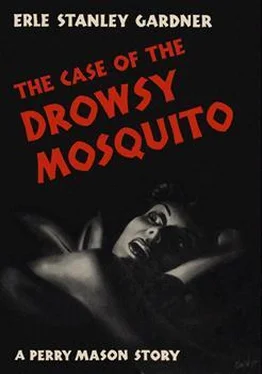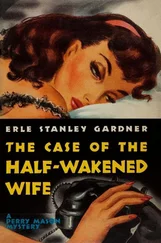“Wore him down,” Nell Sims observed.
“And he actually meant it?” Della asked.
“Sure he meant it. Old Hen was a man of his word. He got his outfit together and waited on the outskirts of San Bernardino to make certain that everyone was along who wanted to come. Then he started out for his mine... They had characters in those days.”
“Then what happened? Were there enough claims to go around?”
Clarke smiled. “That,” he said, “is the pathetic part of it. Old Hen Moss was a good scout, generous to a fault. He’d live out in the desert for weeks at a time on the scantiest provisions imaginable, having a poorly balanced diet, absolutely alone, without anyone to talk to. And then he’d come into town and squander every cent he’d been able to scrape up. And that’s what he’d done just before he returned to his mine. As a result, the horse he was riding wasn’t the best, and Hen Moss probably wasn’t the best rider in the outfit.
“About the time the procession, after several days in the desert, got within a reasonable distance of this watered canyon, the smart ones suddenly realized that this was the end of the road. So they spurred their horses into a gallop and started ahead. Hen Moss clapped spurs into his own horse. That started the stampede. And it must have been some sight — pack horses left behind, a big cloud of desert dust rising up to the heavens, the sun beating down out of a cloudless sky, and these horsemen frantically spurring into a wild gallop over rough desert country, tearing headlong down a steep rocky slope and into a canyon! And poor old Hen Moss was just about at the tail end of the procession.
“The stampede reached the canyon. They found no claims had been staked, and men scurried madly about staking out claims. Those were the days when men had the power of quick decision, and there wasn’t any fumbling around. A man picked what he considered the best available claim, took possession, and held possession. By the time Hen Moss finally got his jaded horse down into the canyon, just about the whole creek had been staked out. Hen Moss heaved himself off his staggering horse and looked around, to see his bonanza in the possession of intruders. Eighty claims had been located ahead of him. The one that Hen Moss finally located was just about the poorest of the whole outfit.”
“The law of retribution,” Nell Sims said.
“And that was the Goler Placer?” Mason asked, realizing by this time that no one ever paid the slightest attention to Nell Sims’ chirping interpolations.
“That was considered to be the Goler Placer. Mining men looked the territory over, remembered the story Goler had told, and decided it was the Goler claim.”
“And it was?” Mason asked.
“It was not.”
Della Street ceased eating to watch Clarke.
“Goler,” Clarke went on, “wasn’t quite as simple as he seemed to be. The story that he told of the location of his bonanza didn’t quite fit the actual facts. The description of the location was doctored just enough so it would fool anyone who wanted to go trailing along behind him, and keep him from being outdistanced at the last by younger men on fresher horses, the way Hen Moss was. Goler was smarter than Moss. He deliberately fabricated the description of the country in which his mine was located.”
“How,” Mason asked, “do you know?”
“Fair question,” Mrs. Sims chirped.
Banning Clarke looked furtively around the kitchen.
“It’s all right,” Nell Sims reassured him. “They’re all in that meeting. Hayward Small nearly always comes in for a cup of tea this time of night, but he won’t be in as long as that meeting’s going.”
Clarke opened his coat, hitched a holster into sight which had once been black but was now faded to a dark brown and polished with much wear. “I want to keep this pretty much out of sight.”
His hand dropped to the holster, snaked out the weapon and placed it on the table.
Mason, Della Street and Mrs. Sims bent over it.
It was a worn, badly rusted single-action Colt revolver. Whatever the finish had originally been, it was now buried under the deep incrustations of rust which had formed a deep, shell over barrel, cylinder, and trigger. The yellowed ivory handle alone had completely resisted the elements. And etched in that ivory handle was the word Goler, and, below that, a date, 1882.
Mason gave a low whistle.
“I found that,” Clarke said, “purely by accident near a little trickling spring beneath some cottonwoods in the desert. The man who was with me had gone off to do some climbing. It was before my heart got as bad as it became later, but even then I was troubled with shortness of breath and was trying to take things easy. I stretched out in the shade of the cottonwood. About three inches of the barrel of this gun was protruding from the ground by the side of the spring. I saw that it was. part of a gun barrel and dug it out, looked at it curiously for a minute, then saw the name Goler and the date — and then knew what I’d found.”
“What did you do?” Della Street asked, her eyes big and shining with excitement.
“I didn’t have any tools or equipment with me,” Clarke said, “but I grubbed around in the bottom of the stream a bit with just my bare hand. There was a little pocket right next to the bedrock, and I scooped out gravel that was thick with gold.”
“But how does it happen no one has ever heard about this?” Mason asked.
“That,” Clarke said, “is the rub. The ground on which that spring was located was part of a quartz claim on which some poor befuddled prospector was starving to death, trying to find rock that would be worth mining. The idea of placer gold on the place had apparently never occurred to anyone. Hang it, the Come-Back Mining Syndicate has an interest in that claim right now, thinking that it holds only a quartz mine of problematical value. Only one of hundreds of similar mining propositions that it’s bought up. And I’m not going to pour any more money into the laps of Mrs. Bradisson and her infallible son, James.”
“Anyone any idea you know about the location of this mine?” Mason asked.
“I think Bradisson does.”
Mason raised his eyebrows.
“Out there in Salty’s camp I have no place to keep anything of this nature, so I left the gun in a drawer in my desk — left it with the side of the handle that had Goler’s name etched on it turned down . Well, a week or so ago, I found that side turned up. I don’t often get up to my room now — it’s a job for me to climb the stairs. I have to take it mighty easy when I go up, resting for a minute or two every second or third step. You see, I have—”
The swinging door creaked on its hinges. Banning Clarke’s hand shot out to the old rust-covered six-shooter, jerked it back out of sight and into the holster.
The door opened. A girl of somewhere around twenty, a lithe girl in a sweater who knew she looked well in a sweater, drew back as she saw the compact little group around the table. “Am I intruding?”
Banning Clarke said, “Not at all, Dorina. Come in. This is Mr. Mason and Miss Della Street, his secretary. — And this is Dorina Crofton, Mrs. Sims’ daughter by her former marriage. — I was just explaining something to Mr. Mason, Dorina, but it’s all right now.”
Clarke turned to the lawyer. “So you see the peculiar position in which I find myself — particularly with reference to the corporation.”
“Do they,” Mason asked, “have any suspicion of the true facts?”
“I think they have.”
“I mean the legal title — the ownership of the property that is — er — involved?”
“Yes.”
Mason’s eyes narrowed. “You say they have an attorney at that meeting?”
Читать дальше












